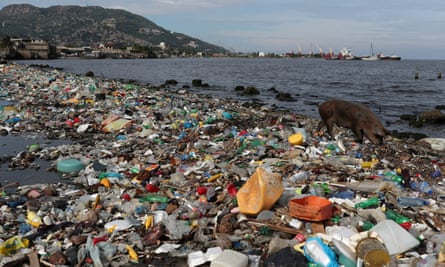Global plastic production must be reduced to tackle the immense challenge of plastic pollution, according to an analysis published on the eve of crucial talks to hammer out the world’s first legally binding treaty on plastic waste.
Mismanaged plastic waste, which leaches into the environment and can be harmful to health, will double to 121m tonnes by 2050 if limits are not placed on the production of plastic, according to Samuel Pottinger, the lead author of the research.
Annual greenhouse gas emissions from the plastic system will increase by 37% over the same period if the world does not place some restrictions on plastic production.
But combining four measures; a global cap on plastic production, investing in waste infrastructure, using a packaging tax and a recycling mandate could reduce mismanaged plastic waste by up to 91% by 2050, and decrease plastics-related emissions by about a third, the research has found.
The study was published in the journal Science, before UN treaty talks in Busan, South Korea, which present the final chance for countries to agree on how to cut plastic pollution.
The talks are on a knife edge with lobbyists for plastic producers and some countries objecting to the treaty including a cap or cuts to production.
All four interventions highlighted as significant in the research are being considered in the draft treaty and will be part of the discussions on 25 November.
Pottinger, of the University of California, Berkeley, said: “The stated goal of the treaty is to end plastic pollution. The results of this new analysis and our interactive tool show very clearly that it will be nearly impossible to end plastic pollution without cuts to plastic production.
“This research truly laid bare to us the immensity of the global challenge of mismanaged plastic waste. It was an exciting and optimistic finding to see in this research that the treaty could very nearly solve this problem.
“But it is a very hard problem that will require a suite of very ambitious policies to solve. Without a production cap, the problem gets harder to solve and the ambition required for other policies goes up.”
More than 50 countries at the treaty talks, including the UK, have signed the Bridge to Busan commitment to ensure it addresses the full lifecycle of plastic, including introducing sustainable production of plastic polymers.
Most of the 547m tonnes of plastic created in 2020 – 32% – was used for packaging, the analysis showed.
Capping production at 2020 levels, when the world was making an immense amount of plastic, would alone reduce global mismanaged plastic waste by 2050 from approximately 121m tonnes to 72m tonnes.

The research spells out the immense harm caused by plastic production, which has increased relentlessly since 1950, and the pollution it creates.
after newsletter promotion
“In the environment, plastic waste breaks into ever smaller pieces, including micro- and nanoplastics, and thus negatively impacts myriad ecosystems, from the Arctic to the deep ocean,” Pottinger said.
“Plastic pollution is associated with diverse human health impacts, such as elevated risk for cancers, cardiovascular disease, and reproductive health. The plastics system is also accelerating climate change, with emissions associated with the extraction and processing of oil and gas used to make plastic, plastic production and plastic waste management.”
The research separated global plastic production and consumption into four regions: North America, China, the EU and the remainder, referred to as Majority World. It examined consumption, waste generation and mismanaged waste.
Annual global plastic consumption reached 547m tonnes in 2020, 86% of which was virgin plastic and 14% recycled plastic. China was the largest consumer of plastics, accounting for 36% of consumption, followed by Majority World 28%, EU 18% and North America 18%.
But while China’s plastic consumption is likely to peak in 2030 then decrease, consumption in North America and Majority World is predicted to grow.
Without intervention to curb production, plastic consumption would increase to 749m tonnes by 2050, but interventions could have a significant effect, the report found. To tackle packaging waste, the creation of a packaging consumption tax would reduce waste, by 145m tonnes.
Introducing a ban on single-use plastic to tackle packaging waste would lower consumption by 98m tonnes, and a reuse mandate (like a deposit return scheme) could reduce plastic packaging by 74m tonnes by 2050.
The interventions on packaging would have huge environmental benefits, the report said, because leakage of often lightweight plastic packaging into the environment was estimated to be particularly large.

.png) 1 month ago
18
1 month ago
18













































